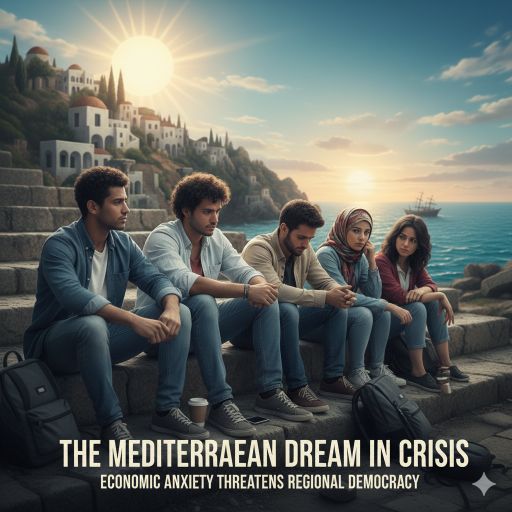The Mediterranean Dream Under Siege: Why Economic Anxiety Threatens Democracy Across the Basin
History teaches us that the toxic combination of rising prices and economic stagnation can destabilize even the most established democracies. We witnessed this in pre-war Germany, and more recently in the United States, where economic frustration helped propel Donald Trump back to power. The lesson is clear: when families feel financially cornered and social mobility becomes a myth, democratic foundations begin to crack.
This pattern isn't confined to any single nation—it's spreading across the Mediterranean like a slow-burning wildfire.
From Spain's housing crisis pricing out entire generations to Italy's brain drain, from Portugal's stagnant wages to the broader challenges facing young people across North Africa and the Balkans, a familiar story emerges. The Mediterranean Dream—that post-World War II promise of homeownership, stable employment, and upward mobility—is withering for millions.
The symptoms are everywhere:
In Spain and Italy, young professionals live with parents well into their thirties, unable to afford independent housing. Across the Adriatic, even traditionally affordable markets in Croatia and Montenegro see locals priced out by foreign investment. In North Africa, educated youth face the stark choice between emigration and economic stagnation. Meanwhile, Turkey grapples with inflation that has made basic necessities luxuries for many families.
The educational systems across the region remain largely disconnected from economic realities. Mediterranean countries built tourism economies while failing to create world-class hospitality education. Nations with rich maritime traditions lack the technical training programs that could capitalize on the blue economy. University degrees proliferate, but specialized trades—often better paid—struggle to attract talent or respect.
What makes this particularly dangerous is that these aren't isolated national problems but shared regional challenges amplified by global forces. EU funds that once bridged gaps are tightening. Climate change threatens traditional industries. Digital transformation rewards those with capital and skills while leaving others behind. Young people across the Mediterranean watch their previously "poorer" neighbors—whether Eastern Europeans buying property in Greece or Gulf investors transforming coastlines—enjoy opportunities that feel increasingly out of reach.
The political implications are profound. Economic anxiety has already reshaped politics in Italy, strengthened populist movements in Spain, and contributed to democratic backsliding in several Balkan nations. When people lose faith in traditional paths to prosperity, they become susceptible to extremist promises and anti-establishment rhetoric.
The window for addressing this crisis is narrowing. Mediterranean societies must act decisively to:
- Realign education with economic opportunities, prioritizing practical skills alongside traditional academia
- Create housing policies that serve residents, not just investors
- Develop regional strategies that leverage shared Mediterranean advantages rather than competing destructively
- Build genuine pathways to economic advancement for younger generations
The alternative is clear: continued economic frustration will feed political instability, threatening the democratic fabric that has defined the modern Mediterranean. The question isn't whether this crisis will reshape regional politics—it's whether leaders will guide that transformation constructively or let it unfold chaotically.
The Mediterranean has survived empires, wars, and revolutions. But it has rarely faced such a widespread crisis of economic opportunity and democratic faith simultaneously. How we respond will determine whether the next generation inherits a region of shared prosperity or fractured dreams.

